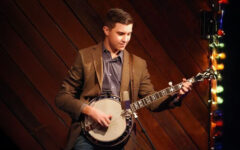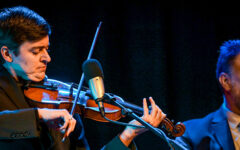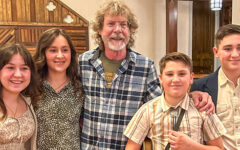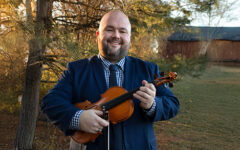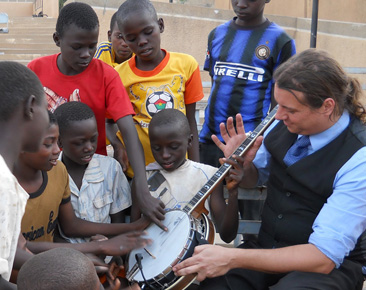
Henhouse Prowlers have agreed to share occasional reports from the band’s African adventure, touring with the American Voices program on behalf of the US Department of State. Here’s their final dispatch, from fiddler Dan Andree.
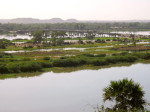 Well friends and faithful followers, we have been back in the States for over a week now and we’re getting right back into the swing of things. However, we didn’t want to deprive you of the last African blog post you so rightfully deserve. So, sit back, relax, and strap it down. We’re off to glorious Niger!
Well friends and faithful followers, we have been back in the States for over a week now and we’re getting right back into the swing of things. However, we didn’t want to deprive you of the last African blog post you so rightfully deserve. So, sit back, relax, and strap it down. We’re off to glorious Niger!
Our first full day in the country would be our only full day in Niamey, the capital. That afternoon, we rode to the venue we’d be playing that evening, Maison de la Culture Djado Sekou, to do a sound check and rehearse with a local band. The band was named Banyuwa and consisted of electric bass and electric guitar players, a Calabsh player (a fairly large semi-sphere of a dried gourd placed open-end-down and played sitting cross-legged behind it as a percussion instrument), a female singer, a male dancer, and a lead singer who played the Molo. Similar to the Mauritanian Tidinit, and other small stringed gourd instruments in the region, the Molo only played in F# (we all tuned down from the typical bluegrass key of G to be able to play with them) and had 3 strings with one peg halfway up the neck akin to the drone string on the 5-string banjo.
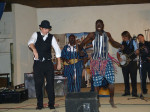 From the first few notes we played together, we all melded immediately and we fed off the seemingly familiar, catchy, and infectious rhythmic melodies of the Molo. Before we taught them High on a Mountain (with the girl rapping between choruses), they taught us their “political action” song in the Burkina Faso language Guarmantché. Phonetically in English, the words were “Ooh yay! Chwa tim kwa ooh bahm tadicho” which roughly translates to “Hey! Sign your kids up for school.” After a successful rehearsal, Banyuwa took to the stage for their opening set. At one point, their dancer came down off the stage, worked his way to the audience, and pulled Jon up by the hand to dance with him. The international dance exchange was a real crowd pleaser.
From the first few notes we played together, we all melded immediately and we fed off the seemingly familiar, catchy, and infectious rhythmic melodies of the Molo. Before we taught them High on a Mountain (with the girl rapping between choruses), they taught us their “political action” song in the Burkina Faso language Guarmantché. Phonetically in English, the words were “Ooh yay! Chwa tim kwa ooh bahm tadicho” which roughly translates to “Hey! Sign your kids up for school.” After a successful rehearsal, Banyuwa took to the stage for their opening set. At one point, their dancer came down off the stage, worked his way to the audience, and pulled Jon up by the hand to dance with him. The international dance exchange was a real crowd pleaser.
We played about a half hour with translation help as we explained the meanings of our songs. The set was well received, and our fast stuff really got the crowd going. At the end of the show, we had Banyuwa come back up for the two songs we rehearsed. Our singing in Guarmantché went over very well and I even tried my hand at shaking along with their dancer. The night felt like a great success, and we headed back to our hotel. Turning in early, we knew we were in for a long travel day the next morning.
Leaving at 8:00 a.m., we started off on our 12 hour ride for the village of Maradi, traveling in a 4 car convoy with all of our equipment, Embassy staff, and all of us spread amongst the vehicles. The road was fairly smooth (although a significant stretch in the middle gave me flashbacks to Liberia) and dotted with tiny villages, some with packed markets and some with women pounding/grinding millet (the local grain) to be stored in clay silo-like structures.
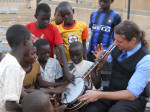 We had another early departure the following morning, heading off at 7:00 a.m. for the village of Zinder. After a 3 hour drive and a bit of time to rest, we headed to Zinder’s government-run cultural center: Maison de la Culture Abdoulsalam Adam de Zinder. It featured a large outdoor concrete stage with stadium seating and the city’s main library. An “American Corner” (a semi-common Embassy sponsored location and/or resource center) was part of the library—in this case in a literal literary corner—and featured a couple computers, TV/DVD player, films, and shelves of books, all donated by the Embassy and funded by the State Department. As we sat around a bit after our sound check, a group of tens of smiling energetic kids, ages 5 to mid-teens, took an interest in us. Ben sat down with them and let whomever wanted to pick at his banjo and we were all instant friends.
We had another early departure the following morning, heading off at 7:00 a.m. for the village of Zinder. After a 3 hour drive and a bit of time to rest, we headed to Zinder’s government-run cultural center: Maison de la Culture Abdoulsalam Adam de Zinder. It featured a large outdoor concrete stage with stadium seating and the city’s main library. An “American Corner” (a semi-common Embassy sponsored location and/or resource center) was part of the library—in this case in a literal literary corner—and featured a couple computers, TV/DVD player, films, and shelves of books, all donated by the Embassy and funded by the State Department. As we sat around a bit after our sound check, a group of tens of smiling energetic kids, ages 5 to mid-teens, took an interest in us. Ben sat down with them and let whomever wanted to pick at his banjo and we were all instant friends.
There was a chance to rehearse a bit with the local opener, Ali Atchibili, before the show, and we followed the precedent set in Niamey with a half hour set by each band followed by a rehearsed number together. The whole night went over well and, not surprisingly, the collaboration got the best response from the audience. They were severely tickled to hear us play in the local band’s style, and each time I simply copied the sung melody a joyous roar erupted from the stands. I couldn’t help but to bare an unharnessed wide grin as once again music had so adeptly bridged a cultural gap that language could not.
 The next day, we headed back to Maradi to play our very last performance of the tour at the Maison de la Culture Bawa Dan wardanga. It was strikingly similar to the cultural center in Zinder and the déjà vu continued as we were once again greeted by tens of young children with wide eyes and without parental supervision (or presence for that matter). After a bit of rehearsal with the opening band Carnivale, they started with their half hour set and the crowd was very engaged. The kids were chomping at the bit for a chance to verbally react by either cheering or repeating call-and-response phrases. We took note, and tried to get them as involved as possible during our set. We taught them Take Me Back to You, and encouraged them to sing along with “Mr. Charlie” and “Ruby.” Ending our set with Ain’t Too Proud to Beg, I decided to take a play from Mr. Calloway to end of the song. Singing things like “Hey, Hey, Hey” while pointing out to the crowd between to repeat after me (eventually having some fun with babbling “Deedilideedilidee”), the entire crowd was roaring in response and the energy reached a fervent peak. The minute the concert ended, we were swarmed by the growing numbers of local youth clambering for pictures and CDs.
The next day, we headed back to Maradi to play our very last performance of the tour at the Maison de la Culture Bawa Dan wardanga. It was strikingly similar to the cultural center in Zinder and the déjà vu continued as we were once again greeted by tens of young children with wide eyes and without parental supervision (or presence for that matter). After a bit of rehearsal with the opening band Carnivale, they started with their half hour set and the crowd was very engaged. The kids were chomping at the bit for a chance to verbally react by either cheering or repeating call-and-response phrases. We took note, and tried to get them as involved as possible during our set. We taught them Take Me Back to You, and encouraged them to sing along with “Mr. Charlie” and “Ruby.” Ending our set with Ain’t Too Proud to Beg, I decided to take a play from Mr. Calloway to end of the song. Singing things like “Hey, Hey, Hey” while pointing out to the crowd between to repeat after me (eventually having some fun with babbling “Deedilideedilidee”), the entire crowd was roaring in response and the energy reached a fervent peak. The minute the concert ended, we were swarmed by the growing numbers of local youth clambering for pictures and CDs.
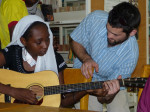 On our last full day in Africa, the following afternoon, we went to an Artisan Cooperative to see and buy some local hand-made wares before going to the American Corner in Maradi (at the same location as the previous evening’s concert) to meet with about 20 high school students and talk with them about our instruments, bluegrass, and America in general. We split up and encouraged questions. One soft-spoken boy sitting next to me asked when America became independent, and for the the first time in my life, I found myself explaining how we fought the British and won our freedom. The day was both restful and fulfilling and felt like a fitting end to our month-long adventure.
On our last full day in Africa, the following afternoon, we went to an Artisan Cooperative to see and buy some local hand-made wares before going to the American Corner in Maradi (at the same location as the previous evening’s concert) to meet with about 20 high school students and talk with them about our instruments, bluegrass, and America in general. We split up and encouraged questions. One soft-spoken boy sitting next to me asked when America became independent, and for the the first time in my life, I found myself explaining how we fought the British and won our freedom. The day was both restful and fulfilling and felt like a fitting end to our month-long adventure.
50+ hours of travel later we were home safe. And as I write now, we’ve had a much needed week of rest and time to catch up with our family and loved ones. I cannot stress how fortunate we all feel to have been given such a wild and incredible gift that was our American Music Abroad tour. Attempting to encompass the entire trip or thanking everyone that ought to be thanked in these last lines would not do the experience (or those that made it possible) justice. But to Marc, Bill, everyone working with American Voices, the State Department, all of the staff at the US Embassies abroad, and to our beautiful cheering section back home … Thank. You. All. Here’s to many more unforeseen adventures in all of our futures!

